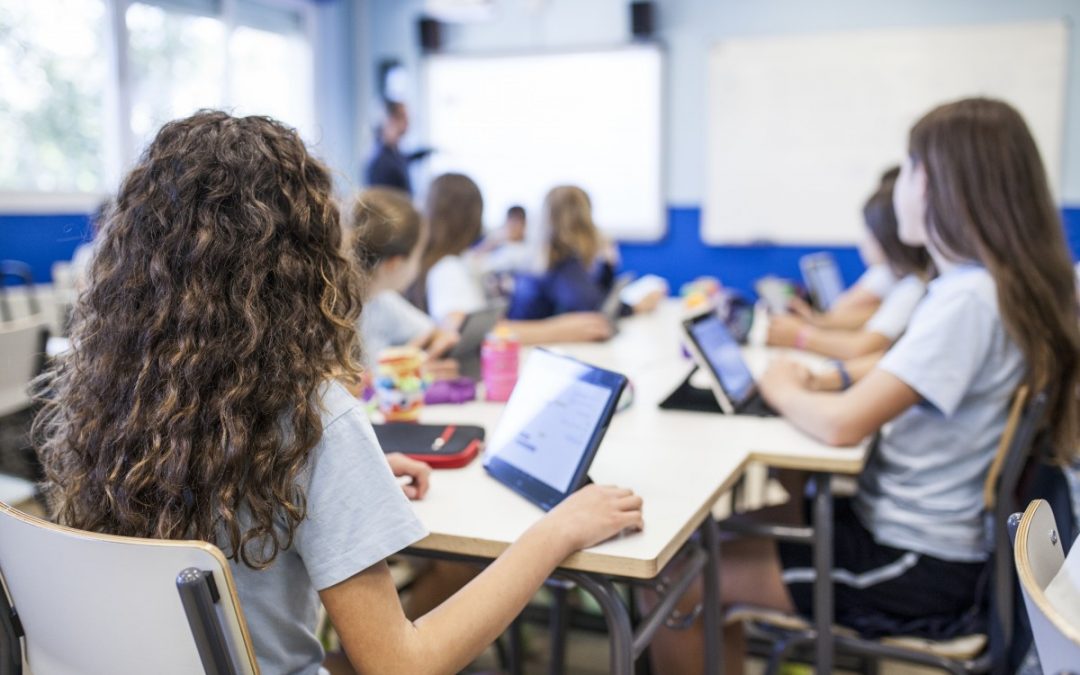Stepping into a modern classroom is an assault on the senses. Children are subjected to a learning space constantly aglow with screens. The humble chalkboard has bitten the dust and been replaced with whiteboard-sized interactive screens. As if this isn’t enough, gone are the days of the classroom computer sitting under a plastic cover waiting for the next research task or library book search.
Now days classrooms contain laptop lockers that secure and charge individual computers for individual kids. Younger students from kindergarten to Year 2 will have their own iPad or tablet at their table standing next to their seldom used pencil cases. In modern classrooms technology reigns.
But are kids really benefiting from this constant connection to the world wide web? Should we be utilising technology to boost communication skills? Is it the best way to let our kids explore their creative sides?
Now to the technologically challenged the concept of technology in the classroom is either going to give you anxiety and a fresh feeling of ineptness and bewilderment (like my mother – a teacher of 30+ years), or it’s going to make you think, “Oh great! What lovely opportunities our young ones will have for research and… well whatever else it is they do on those computers.”
As a teacher, let me break down how technology is being used in the classroom and together we can weigh the pros and cons.
classroom technology
An average day in a technology laden classroom looks like this:
Spelling – students put on headphones and are read their weekly list words by the computer program. They type them out and check their spelling afterwards. They then go on and ‘play’ a variety of interactive games that test their knowledge of spelling. This might happen at regular intervals during the week. On Fridays the computer will read them the words again for their weekly spelling test.
Maths – students will use a mathematics program or website that is more or less an interactive textbook with. They will complete tasks that the teacher has set. Quickly students find out that if you finish all your tasks there is a bonus online game that actually requires very little mathematical knowledge to play. (Remember – students acclimatise to computers much quicker than their teachers do, so chances are they will know how to use them to suit themselves better than their supervisors.)
Writing – oh they have writing books, but they generally self-destruct under their desks, in their bags, or on a shelf somewhere. Story writing or information reports, or essays are now typed and saved and printed. This is good news for the poor spellers and handwriters in that it makes life easier but from a teacher’s perspective it is not providing assistance in developing skills for life.
Science/ History – with personal computers the world is at your fingertips. Scientists and historians, geographers and researchers all jump for glee. But are our kids ready to have that power? Do they know how to use it wisely, choosing valid sources of information above poor ones. No they don’t. Students gravitate to what is easy to read and draws their attention and they do it almost every day of their school life.
While technology is not all doom and gloom – there are some positive and progressive reasons to make use of them in the classroom – they are chipping away at our youths’ ability to connect and communicate to another individual. They are losing the ability to quickly compute numbers in their head and they are getting frustrated and shrugging their shoulders to compensate for their inability to find words to express themselves.
Bring back the ruled margins and encouragement to take your time and do things carefully and thoroughly. Bring back intentional research into the classroom where kids are given the skills to filter poor sources of information for accurate ones rather than being thrown into the deep murky waters of the internet. Bring back the focus on creativity, on public speaking and debate. Bring back exciting ways to learn. Bring back the joy of learning drama. Bring back to Australian classrooms childish enthusiasm and kids who can hold their heads high.
